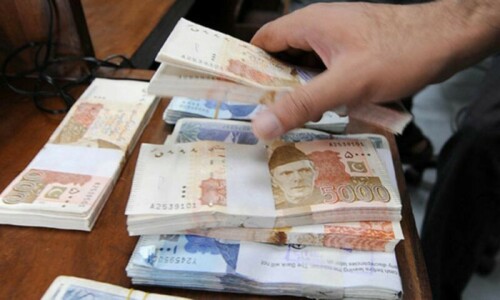ISLAMABAD: With immediate effect, the government on Wednesday slashed profit rates on all, but two, national savings instruments including those in the so-called Sharia-compliant papers.
The returns on two savings instruments that were kept unchanged at 20.5 per cent for now included a conventional savings account and a Sarwa Islamic Savings Account (SISA).
The reduction in returns has come about following a minor decline in cut-off yields on government papers (T-bills etc) in the previous auction in anticipation of a possible cut in the central bank’s policy rate going forward that currently stood at 22pc. This is the third cut in the yields on savings in about two months, i.e. since Dec 19, 2023.
According to notifications issued by the Ministry of Finance, the rate of return on Special Savings Certificates (SSC) and accounts has been reduced by 40 basis points to 15.6pc from 16pc for the first five years. This means the saver would now get Rs7,800 per six months on Rs100,000 from Rs8,000 as of Feb 20. This has been slashed by a cumulative 80bps from 16.04pc last month. The rate for the sixth year has been kept unchanged at 16.6pc which was cut by 80bps from 17.4pc on Jan 26.
Banks investing in T-bills; PIBs still earning 21pc
The rates for Defence Savings Certificates have witnessed on average 55 basis points to 13.67pc from 14.2pc in January and 14.39pc in December. Under this scheme which is normally a long-term savings investment, the investors would not face any loss in the first two years but start facing profit cuts for the next seven years (3 to 10) and would see gradual reductions in line with the expected interest rate cuts.
Likewise, the return on Regular Income Certificates has been cut by 36bps to 14.64pc from 15pc. In January, the returns on the scheme were reduced by 12bps from 15.12pc.
Similarly, the profit rates on Behbood Savings Certificates (BSCs) have been cut by 72bps to 15.36pc against 16.08pc. In the last, revision in January, the rates were kept unchanged on BSCs. Only widows, senior citizens and physically challenged persons can avail this scheme.
The similar pensioner’s benefit account, allowed only to retired government employees was slashed with the same ratio of 72bps to 15.36pc. Another similar cut of 72bps was applied to Shuhadas Family Welfare Account (SFWA) — from 16.08pc to 15.36pc.
Also, the returns on Short-Term Savings Certificates (STSC) have been reduced by 58bps to 19.76pc from 20.34pc. As such, the return on three-month STSC will come down to Rs4,980 on an investment of Rs100,000 against Rs5,070 at present and Rs5,180 in January. The six-month STSC instrument would now earn Rs9,950 per Rs100,000 against Rs10,150 earlier. In the same category, the one-year paper would now yield Rs19,760 on Rs100,000 instead of Rs20,340. These certificates were used to offer 20.8pc return before Jan 26.
On the other hand, the Sharia-compliant instruments have met similar treatment, except the one-year SITA that would remain unaffected at 18.54pc ‘expected return’. This product had seen a major setback last month when its return was reduced by 283bps from 21.37pc earlier. The return is payable on maturity i.e. one year.
The investors of longer-tenor Islamic products continued to suffer. The expected return on three-year SITA has been slashed by 20bps to 15.2pc from now onwards against 15.4pc as of now. Its return was cut by 26bps last month from 18pc. The profit on a three-year SITA is payable on a bi-annual basis.
The government appears to have changed this direction as it is still paying over 21pc on investment bonds and T-bills to secondary market players in a captive market of government papers but gradually lowering returns to its powerless citizens despite being the safest borrowing.
Published in Dawn, February 22nd, 2024














































